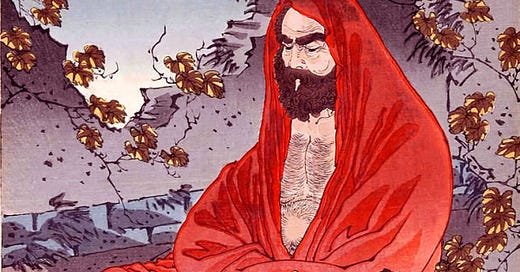At the center of Hinduism is the cyclical nature of destruction and creation constantly feeding into one another. From concepts relating from birth to death to the constantly evolving fabric of the universe, this concept extends to almost everything.
If we say our lives are like a book with many chapters then I’d like to say each chapter is defined by certain ideals and view on the way we view ourselves and the world. Every single action, motivation and subsequent reactions are all attached to this. But eventually whether through subtle changes or violent action this notion on how we view ourselves completely changes until you reach a point where that idea of yourself becomes a distant idea.
A past life.
A previous chapter.
The very notion of who you are is changed.
New creation fed by the destruction of old.
The Zen tradition calls this “beginner’s mind”, the ability to approach each moment fresh, without being trapped by who we think we are or what we think we know. Not forgetting our experience, but not letting it cage us either.
Which plays out on every level of the universe. Stars that eventually turn into massive black holes which then in turn create more stars. Leaves that die but become a source of energy for new plants to grow. Creative and destructive energy entangled in an endless cosmic dance.
Which means any attachments we have will change whether we choose to accept it or not. What was true in one moment will be false in the next.
The very nature of the universe is one of constant change.
Thus, while it can be difficult to go through, I think it’s important to evaluate the ideas and world view you are attached to and accept having to let it go.
To have to start from scratch again.
The process of letting go over and over again.
While aging can be seen in the context of the body, I see true aging as losing the ability to do this with your mind.
Good startups are formed with an interesting idea. Great companies are created through constant re-evaluation, their ability to change and let go. The ability to change is their inherent strength. Which is set by no one else but the leaders of the company, who must first master this in themselves.
It’s important to not box yourself into a certain persona.
To lose this sense of permanence of saying I am this and rather being whatever you are needed to be.
Because one day you won’t be that anymore.
So it’s better to lean into this evolving change rather than constantly keep fighting it.
I spent the last year of my life constantly telling myself a narrative of who I was and why I do what I do.
It defined me.
I became attached to this idea of who I was. I inherited this persona as what I believed I was. I attached my entire self identity to being this. To having to make this thing work.
Which made me stuck.
Until I had no choice but turning the page. Letting it go.
Because the very story that once enabled growth had become the cage preventing it.
With no one to blame but myself.
The absence makes it even more harrowing.
It made it painful.
It makes it painful.
But leads me to now where I start a new chapter with a seemingly blank page.
Where the question of who I am is not simple.
Where other parts of my life I happily ignored start to matter.
And I figure out where to go next. Hopefully somewhere which seems like the right place to grow.
Or back here writing into the void about the pain of letting go.
Check out this Podcast Episode!
You can also listen on Spotify, Apple Music, and Google Podcasts
In this episode of Building Blocks, we sit down with Emre Ertan, co-founder and co-CEO of Cenoa, a borderless super wallet revolutionizing how people in emerging markets access digital dollars.
Previously the CPO/CTO at Getir where he scaled the engineering team from 80 to 400 people, Emre shares his journey from a small town in Turkey to Silicon Valley, and how that experience shaped his vision for democratizing financial access globally.
He discusses Cenoa's explosive growth in Nigeria (50K+ signups in first month), their innovative approach to simplifying blockchain technology for everyday users, and his perspectives on building compliant fintech products across 40+ markets.
Thanks for reading,
Daivik Goel




